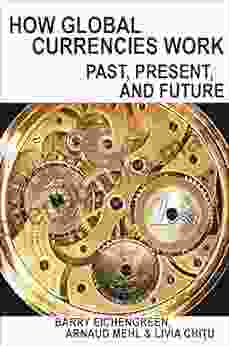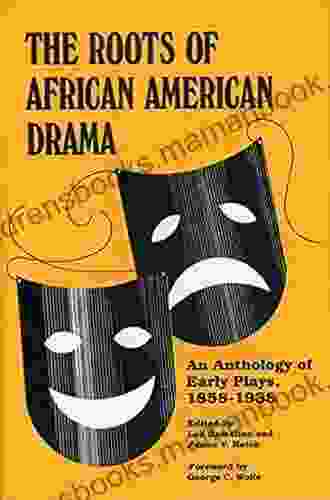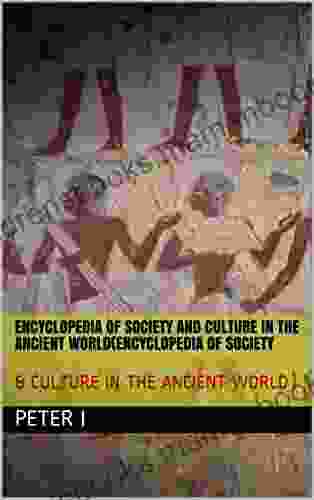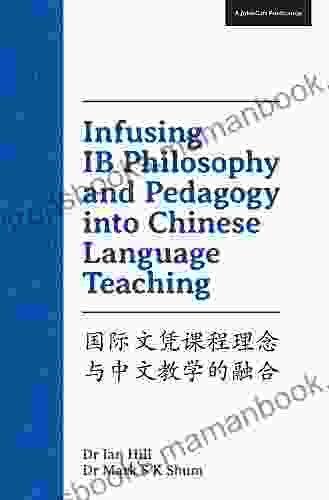Infusing IB Philosophy and Pedagogy Into Chinese Language Teaching: A Path To Enhanced Learning

The International Baccalaureate (IB) program is a rigorous academic program that prepares students for higher education and life in a globalized world. The IB philosophy is based on the belief that all students can learn and that they should be encouraged to develop their critical thinking skills, inquiry skills, and intercultural understanding. These principles are aligned with the goals of Chinese language teaching, which seeks to develop students' proficiency in the Chinese language while also fostering their understanding of Chinese culture and society.
4.8 out of 5
| Language | : | English |
| File size | : | 15888 KB |
| Text-to-Speech | : | Enabled |
| Screen Reader | : | Supported |
| Enhanced typesetting | : | Enabled |
| Word Wise | : | Enabled |
| Print length | : | 216 pages |
| Lending | : | Enabled |
In this article, we will explore the potential benefits of integrating IB philosophy and pedagogy into Chinese language teaching. We will discuss how IB principles can be applied to the teaching of Chinese language and culture, and we will provide examples of classroom activities and assessments that can help students develop the skills and knowledge that they need to succeed in the IB program.
IB Philosophy and Pedagogy
The IB philosophy is based on four key principles:
- Holistic education: The IB believes that education should be holistic, encompassing the development of the whole person—intellectually, physically, emotionally, and ethically.
- Inquiry-based learning: The IB encourages students to learn through inquiry, which involves questioning, investigating, and drawing their own s.
- Intercultural understanding: The IB believes that it is important for students to understand different cultures and perspectives, and to develop a sense of global citizenship.
- Assessment for learning: The IB uses assessment to help students learn, rather than simply to measure their knowledge and skills.
These principles are reflected in the IB's pedagogy, which is based on the following key elements:
- Constructivism: The IB believes that students construct their own knowledge and understanding through their experiences and interactions with the world.
- Differentiated instruction: The IB encourages teachers to differentiate instruction to meet the needs of individual students.
- Assessment for learning: The IB uses assessment to help students learn, rather than simply to measure their knowledge and skills.
Benefits of Infusing IB Philosophy and Pedagogy Into Chinese Language Teaching
There are several potential benefits of integrating IB philosophy and pedagogy into Chinese language teaching. These benefits include:
- Improved critical thinking skills: IB philosophy and pedagogy encourage students to develop their critical thinking skills, which are essential for success in higher education and in life.
- Enhanced inquiry skills: IB philosophy and pedagogy encourage students to learn through inquiry, which helps them to develop the skills they need to research and explore new topics.
- Increased intercultural understanding: IB philosophy and pedagogy emphasize the importance of intercultural understanding, which helps students to develop a sense of global citizenship.
- Improved language proficiency: IB philosophy and pedagogy encourage students to use the target language in a variety of contexts, which helps them to improve their proficiency in the language.
Applying IB Principles to Chinese Language Teaching
IB philosophy and pedagogy can be applied to the teaching of Chinese language and culture in a variety of ways. Here are a few examples:
- Inquiry-based learning: Teachers can use inquiry-based learning to help students learn about Chinese language and culture. For example, students can be asked to research a particular topic related to Chinese culture and then present their findings to the class.
- Intercultural understanding: Teachers can use IB philosophy and pedagogy to help students develop an understanding of Chinese culture and society. For example, students can be taught about the history of China, the Chinese government, and the Chinese people.
- Constructivism: Teachers can use constructivism to help students construct their own knowledge and understanding of Chinese language and culture. For example, students can be asked to create a project that demonstrates their understanding of a particular concept.
- Differentiated instruction: Teachers can use differentiated instruction to meet the needs of individual students. For example, students who are struggling with a particular concept can be given extra support, while students who are excelling can be challenged with more advanced material.
Assessment for Learning
Assessment is an important part of the IB philosophy and pedagogy. IB philosophy and pedagogy emphasize the importance of using assessment to help students learn, rather than simply to measure their knowledge and skills.
There are several different ways to use assessment for learning in Chinese language teaching. Here are a few examples:
- Formative assessment: Formative assessment is used to provide feedback to students during the learning process. Formative assessment can be used to assess students' understanding of a particular concept, or to assess their progress on a particular task.
- Summative assessment: Summative assessment is used to measure students' knowledge and skills at the end of a unit or course. Summative assessment can be used to assess students' overall understanding of a particular topic, or to assess their ability to apply their knowledge and skills to new situations.
- Self-assessment: Self-assessment is used to help students reflect on their own learning. Self-assessment can be used to help students identify areas where they need to improve, or to set goals for their future learning.
Integrating IB philosophy and pedagogy into Chinese language teaching can have several potential benefits, including improved critical thinking skills, enhanced inquiry skills, increased intercultural understanding, and improved language proficiency. By using IB principles and practices, teachers can create a more engaging and effective learning environment for their students.
4.8 out of 5
| Language | : | English |
| File size | : | 15888 KB |
| Text-to-Speech | : | Enabled |
| Screen Reader | : | Supported |
| Enhanced typesetting | : | Enabled |
| Word Wise | : | Enabled |
| Print length | : | 216 pages |
| Lending | : | Enabled |
Do you want to contribute by writing guest posts on this blog?
Please contact us and send us a resume of previous articles that you have written.
 Top Book
Top Book Novel
Novel Fiction
Fiction Nonfiction
Nonfiction Literature
Literature Paperback
Paperback Hardcover
Hardcover E-book
E-book Audiobook
Audiobook Bestseller
Bestseller Classic
Classic Mystery
Mystery Thriller
Thriller Romance
Romance Fantasy
Fantasy Science Fiction
Science Fiction Biography
Biography Memoir
Memoir Autobiography
Autobiography Poetry
Poetry Drama
Drama Historical Fiction
Historical Fiction Self-help
Self-help Young Adult
Young Adult Childrens Books
Childrens Books Graphic Novel
Graphic Novel Anthology
Anthology Series
Series Encyclopedia
Encyclopedia Reference
Reference Guidebook
Guidebook Textbook
Textbook Workbook
Workbook Journal
Journal Diary
Diary Manuscript
Manuscript Folio
Folio Pulp Fiction
Pulp Fiction Short Stories
Short Stories Fairy Tales
Fairy Tales Fables
Fables Mythology
Mythology Philosophy
Philosophy Religion
Religion Spirituality
Spirituality Essays
Essays Critique
Critique Commentary
Commentary Glossary
Glossary Bibliography
Bibliography Index
Index Table of Contents
Table of Contents Preface
Preface Introduction
Introduction Foreword
Foreword Afterword
Afterword Appendices
Appendices Annotations
Annotations Footnotes
Footnotes Epilogue
Epilogue Prologue
Prologue Lisa Howard
Lisa Howard Joan Lee
Joan Lee Daniel Patterson
Daniel Patterson Wilkie Martin
Wilkie Martin Mel Brooks
Mel Brooks Peter Hathaway Capstick
Peter Hathaway Capstick Kim Brophey
Kim Brophey L M Hughes
L M Hughes Izzy Sweet
Izzy Sweet Meira Levinson
Meira Levinson Tom Furniss
Tom Furniss Deborah Nichols Poulos
Deborah Nichols Poulos Amy Medling
Amy Medling Joel Best
Joel Best Harley Tate
Harley Tate Thomas Johnson
Thomas Johnson Liz Lee Heinecke
Liz Lee Heinecke Grigori Grabovoi
Grigori Grabovoi Robert Sheckley
Robert Sheckley Kathryn Lankston
Kathryn Lankston
Light bulbAdvertise smarter! Our strategic ad space ensures maximum exposure. Reserve your spot today!

 Pablo NerudaUnveiling the Poetic Genius of John Wilmot: A Comprehensive Exploration of...
Pablo NerudaUnveiling the Poetic Genius of John Wilmot: A Comprehensive Exploration of...
 Braeden HayesMdina By Midnight Musical Scores Collection: A Journey Through Time and Music
Braeden HayesMdina By Midnight Musical Scores Collection: A Journey Through Time and Music Terence NelsonFollow ·17.2k
Terence NelsonFollow ·17.2k Emanuel BellFollow ·16k
Emanuel BellFollow ·16k Neal WardFollow ·13.3k
Neal WardFollow ·13.3k Richard SimmonsFollow ·15.3k
Richard SimmonsFollow ·15.3k Desmond FosterFollow ·9.9k
Desmond FosterFollow ·9.9k Lucas ReedFollow ·10.4k
Lucas ReedFollow ·10.4k Albert CamusFollow ·15.1k
Albert CamusFollow ·15.1k Jayson PowellFollow ·16.9k
Jayson PowellFollow ·16.9k

 Tom Clancy
Tom ClancyReading Wellness: Lessons in Independence and Proficiency
Reading is a fundamental skill that can...

 Brody Powell
Brody PowellHow Global Currencies Work: A Comprehensive Guide to...
Overview of...

 Dwight Bell
Dwight BellDune by Frank Herbert: An Epic Space Opera That Explores...
Dune by Frank...

 Ronald Simmons
Ronald SimmonsAn Anthology of Early Plays (1858-1938): A Journey into...
: Uncovering...

 Dominic Simmons
Dominic SimmonsCulture in the Ancient World: A Comprehensive Exploration...
Culture is a complex and multifaceted concept...
4.8 out of 5
| Language | : | English |
| File size | : | 15888 KB |
| Text-to-Speech | : | Enabled |
| Screen Reader | : | Supported |
| Enhanced typesetting | : | Enabled |
| Word Wise | : | Enabled |
| Print length | : | 216 pages |
| Lending | : | Enabled |










